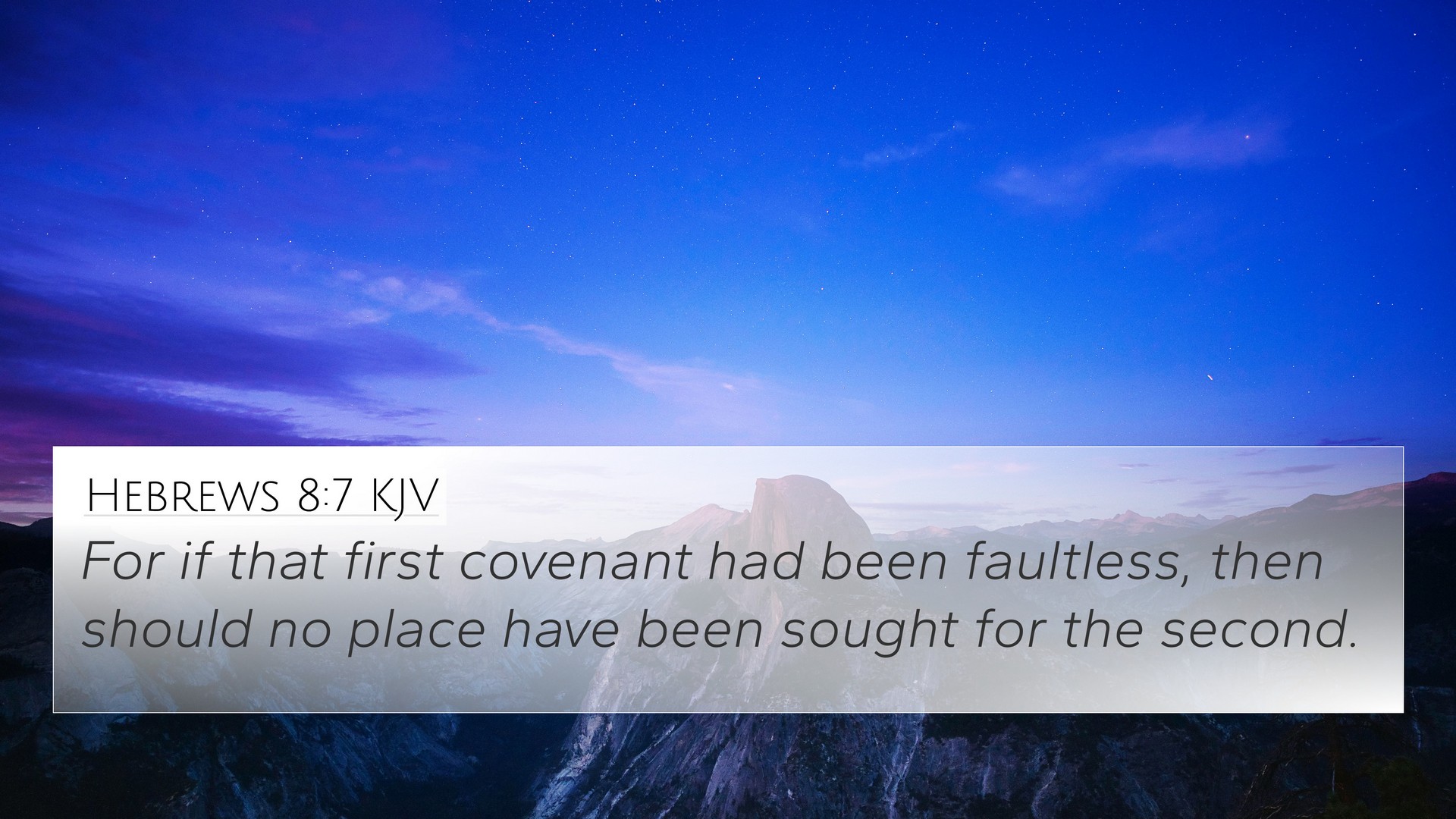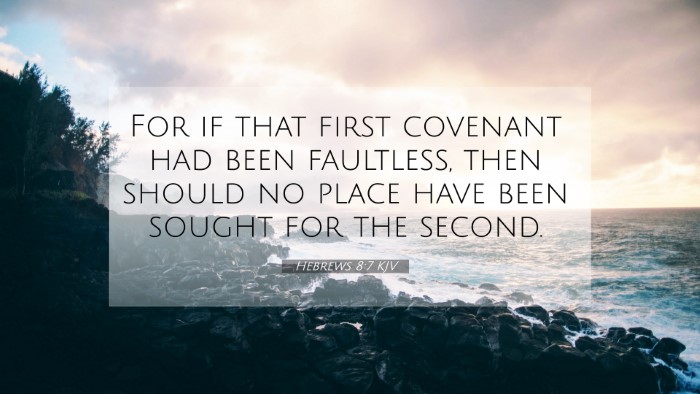Old Testament
Genesis Exodus Leviticus Numbers Deuteronomy Joshua Judges Ruth 1 Samuel 2 Samuel 1 Kings 2 Kings 1 Chronicles 2 Chronicles Ezra Nehemiah Esther Job Psalms Proverbs Ecclesiastes Song of Solomon Isaiah Jeremiah Lamentations Ezekiel Daniel Hosea Joel Amos Obadiah Jonah Micah Nahum Habakkuk Zephaniah Haggai Zechariah MalachiHebrews 8:7 Similar Verses
Hebrews 8:7 Cross References
For if that first covenant had been faultless, then should no place have been sought for the second.
Uncover the Rich Themes and Topics of This Bible Verse
Listed below are the Bible themes associated with Hebrews 8:7. We invite you to explore each theme to gain deeper insights into the Scriptures.
Hebrews 8:7 Cross Reference Verses
This section features a detailed cross-reference designed to enrich your understanding of the Scriptures. Below, you will find carefully selected verses that echo the themes and teachings related to Hebrews 8:7 KJV. Click on any image to explore detailed analyses of related Bible verses and uncover deeper theological insights.
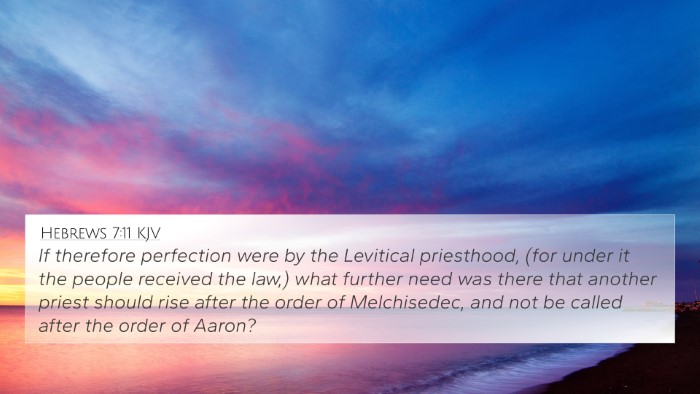
Hebrews 7:11 (KJV) »
If therefore perfection were by the Levitical priesthood, (for under it the people received the law,) what further need was there that another priest should rise after the order of Melchisedec, and not be called after the order of Aaron?
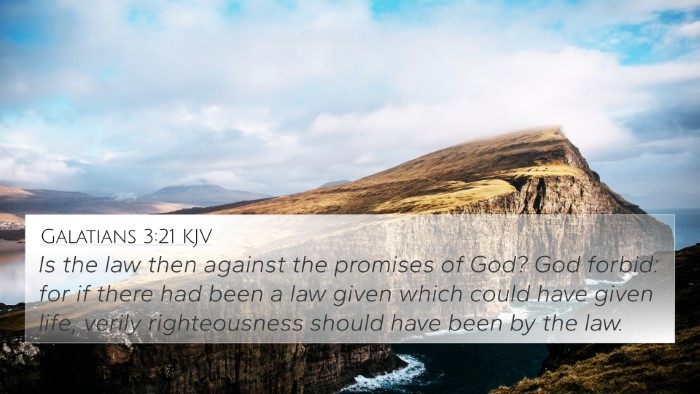
Galatians 3:21 (KJV) »
Is the law then against the promises of God? God forbid: for if there had been a law given which could have given life, verily righteousness should have been by the law.
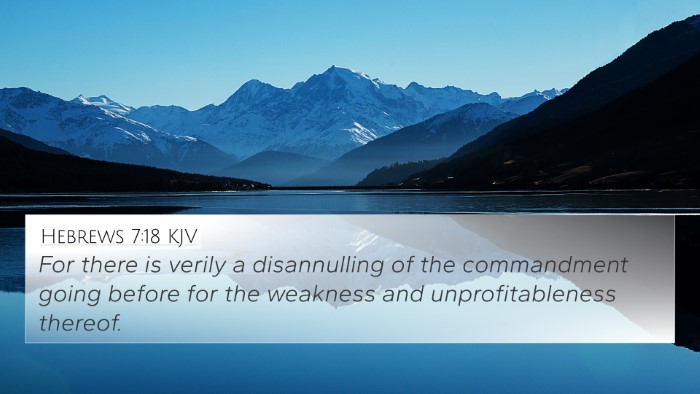
Hebrews 7:18 (KJV) »
For there is verily a disannulling of the commandment going before for the weakness and unprofitableness thereof.
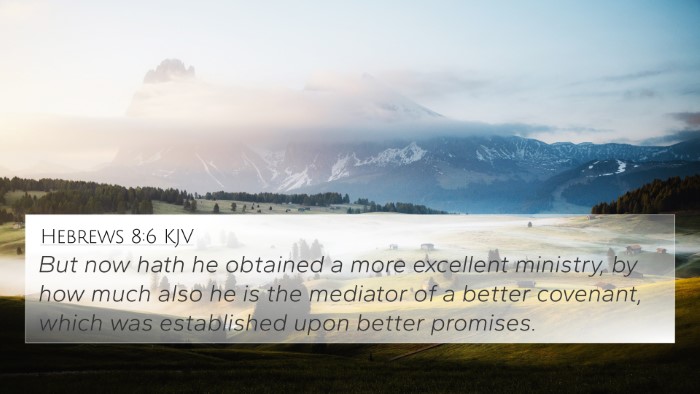
Hebrews 8:6 (KJV) »
But now hath he obtained a more excellent ministry, by how much also he is the mediator of a better covenant, which was established upon better promises.
Hebrews 8:7 Verse Analysis and Similar Verses
Understanding Hebrews 8:7
Hebrews 8:7 states, "For if that first covenant had been faultless, then should no place have been sought for the second."
This verse addresses the concept of the old covenant, which was established under Moses, and introduces the need for a new covenant through Jesus Christ. The author's argument is that the first covenant had imperfections that necessitated a new one, shifting focus from rituals and laws to a more personal and internalized faith.
Insights from Public Domain Commentaries
-
Matthew Henry:
Henry points out that the old covenant was limited and could not achieve complete forgiveness of sins. He illustrates that the shortcomings of the law included its inability to change the heart of man and bring him into a full relationship with God. Thus, the introduction of a new covenant was essential for redemption and fellowship with God.
-
Albert Barnes:
Barnes elaborates on the theme of the first covenant being imperfect. He states that the need for the second covenant indicates that God had a better plan for humanity through Christ's sacrifice. This new covenant is rooted in grace and truth, contrasting the conditional blessings of the old covenant.
-
Adam Clarke:
Clarke highlights the importance of recognizing the transition from the old to the new covenant. He remarks that the first covenant's faults were not due to God’s inability but rather the nature of humanity’s heart, which required a more profound internal change that Christ's covenant provides.
Cross References Related to Hebrews 8:7
This verse connects with various other scripture passages that enhance its understanding:
- Jeremiah 31:31-34: Prophesies about the new covenant.
- Matthew 26:28: Jesus speaks of His blood establishing the new covenant.
- Romans 8:3: Discusses the law's inability to bring righteousness.
- Galatians 4:24: Compares the old and new covenants as two mothers representing two Jerusalems.
- Hebrews 7:22: Jesus is the guarantor of a better covenant.
- 2 Corinthians 3:6: The ministry of the new covenant brings life.
- Hebrews 10:9-10: Christ did away with the first covenant to establish the second.
Thematic Connections through Cross-Referencing
By exploring these inter-Biblical dialogues, we gain insights into the smooth transition between the Old and New Testaments. The connections unveil God’s overarching plan for salvation, showcasing the continuity and evolution of biblical themes.
The thematic Bible verse connections between these scriptures enable a deeper understanding of God's redemptive work, guiding believers in recognizing the significance of the new covenant established through faith in Jesus Christ.
Tools for Bible Cross-Referencing
To gain a better understanding and practice cross-referencing in your Bible study, consider utilizing:
- Bible concordance
- Bible cross-reference guide
- Cross-reference Bible study methods
- Bible chain references
- Comprehensive Bible cross-reference materials
User Intent Keywords Exploration
For those seeking to understand the connections between various scriptures, it becomes crucial to ask:
- What verses are related to Hebrews 8:7?
- How do Hebrews 8:7 and Jeremiah 31:31 connect?
- Which Bible verses support the teachings found in Hebrews 8:7?
Conclusion
Hebrews 8:7 serves as a pivotal scripture underscoring the transformative transition from the old covenant to the new one. Through careful study and cross-referencing, believers can grasp the depth of God's plans and the richness of His grace offered through Christ.
